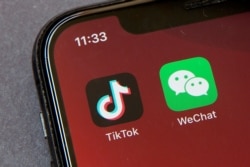China issued new regulations Saturday on its proposed list of “unreliable entities,” measures that punish foreign companies that Beijing says endanger its national sovereignty and security.
According to a statement issued by the commerce ministry on its website, the rules, which went into immediate effect, include a wide range of penalties, including restricting trade and visas for any company, organization or person that appears on what amounts to a blacklist.
The news came one day after the U.S. Commerce Department issued an order that would restrict U.S. users' access to Chinese-owned TikTok and WeChat apps on Sunday. The move represented a sharp downward spiral in the unraveling of trade relations between Beijing and Washington.
Security risks
The Trump administration argues the apps are security risks that gather data on American users. U.S. officials also say that because the apps are made by Chinese-owned companies, they are unable to protect that data from China’s authoritarian government.
In a separate statement Saturday, China’s Ministry of Commerce spokesman condemned the move against WeChat and TikTok, saying the government would take “necessary measures” to protect the legitimate interests of Chinese firms, without elaborating.
The Chinese government first announced it would draw up its unreliable-entities list in May 2019 when the two countries were at the height of the trade war and the U.S. tightened restrictions over Huawei. Beijing has waited until now to finally announce the long-awaited rules of how the list will work.
For domestic audience
Dr. Frank Xie, an associate professor of marketing at the University of South Carolina-Aiken, said Beijing's move is mainly a countermeasure to similar actions taken by the U.S., and it is aimed at its domestic audience.
"China still relies heavily on American technology. It is still eager for U.S. companies to invest in the country," Xie told VOA. "This kind of tit-for-tat escalation is only to show to its own people that the government did not succumb to American pressure."
While the regulation was announced, the Chinese Commerce Department has not named any specific companies or individuals that would land on the list.
Liao Shiping, a professor at Beijing Normal University, told Chinese state media that the announcement did not mean China was closing up its domestic market. “Faced with the spread of protectionism and the continued worldwide decline of international investment, China is unswerving in continuing to expand liberalization,” Liao was quoted as saying.





